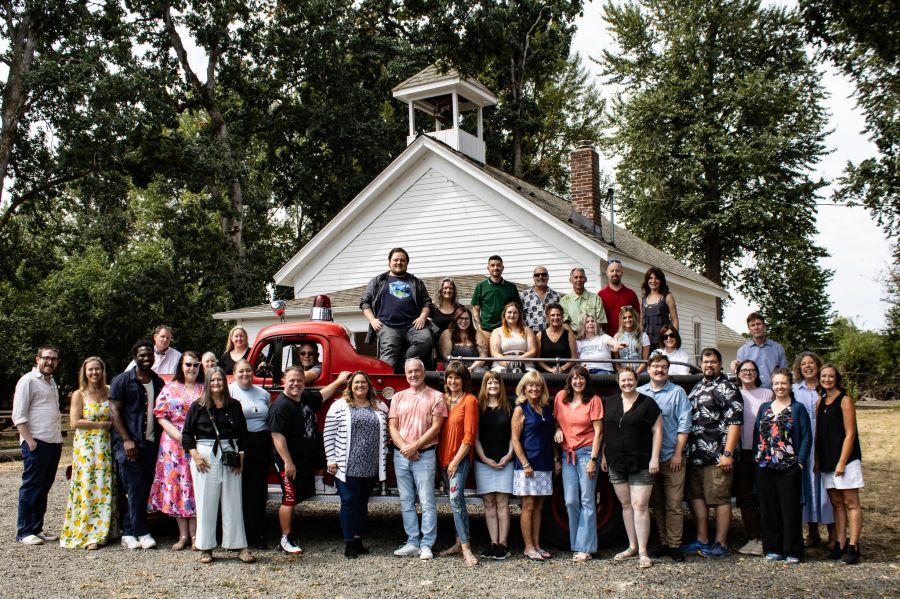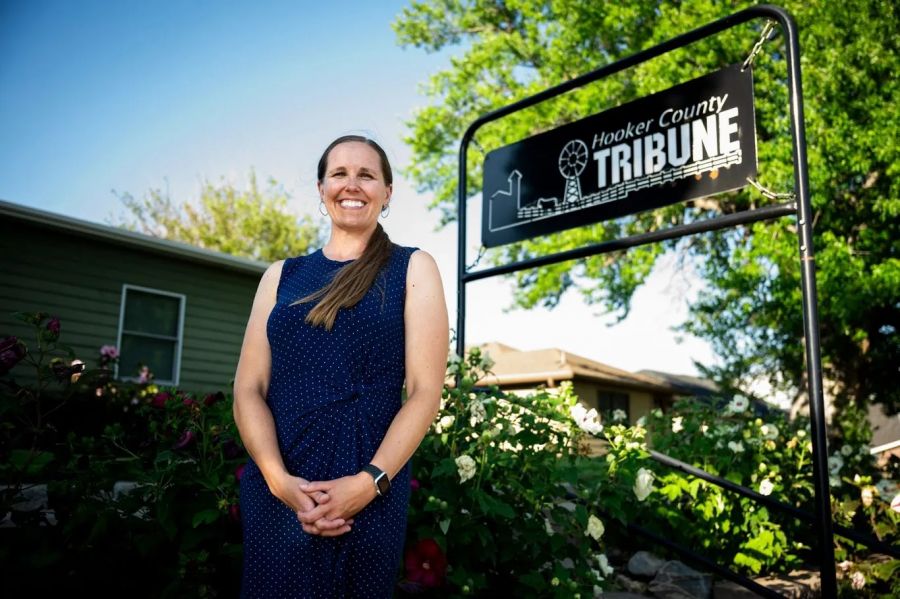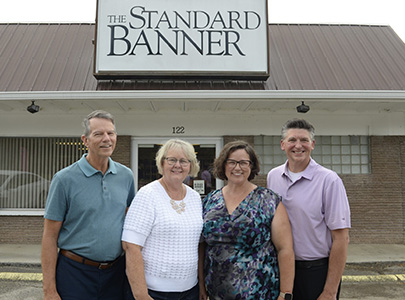Press Forward grants help newspapers keep their presses running and their communities informed
Teri Saylor
Special to Publishers' Auxiliary
Jan 1, 2025
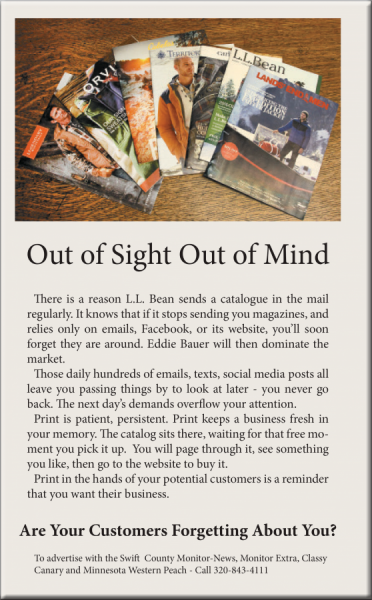

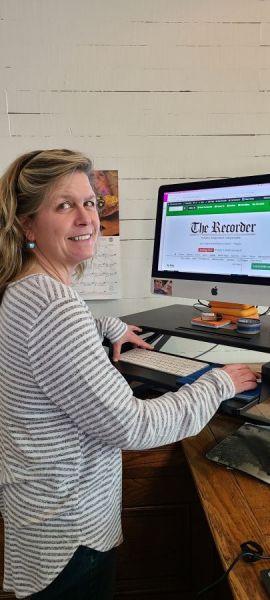
Editor's Note: This is the first in a short series of stories about newspapers that received funding through Press Forward’s first round of grant funding.
Upgrades, enhancements, sustainability and public service are on the minds of the newspaper publishers who received a $100,000 grant from Press Forward, a national movement to strengthen communities by reinvigorating local news.
Reed Anfinson, publisher of the Swift County Monitor-News in Benson, Minnesota, and Anne Adams, publisher of The Recorder in Monterey, Virginia, are in many ways typical of rural weekly newspaper owners. They are deeply passionate about their communities, but they are struggling with the reality brought on by social media domination and declining revenues. That the political landscape is becoming ever more polarized fuels new animosities neither have seen before in their careers.
In a news release last spring, Press Forward announced its national initiative to strengthen communities and democracy by supporting local news and information. Formed in 2023 when a coalition of 22 donors injected over $500 million into a five-year funding engine, the initiative will enhance local journalism and re-establish local news as a force for community cohesion, support new models and solutions that are ready to scale, and close longstanding inequities in journalism coverage, the release stated.
Press Forward points to the decline in local newspapers over the last 20 years and calls to mind that approximately 2,200 local newspapers have closed, resulting in 20 percent of Americans living in “news deserts” with little to no reliable coverage of important local events.
Last spring, Press Forward opened its first round of funding with over 900 news organizations applying for a portion of $20 million. The 205 recipients each received $100,000 distributed over two years. Among the recipients are online news organizations, nonprofits, advocacy groups and newspapers. Grants reached into nooks and crannies all over the country and funded at least one recipient in every state.
Reed Anfinson, Swift County Monitor-News, Benson, Minnesota
Typical of most community publishers, Reed Anfinson does it all.
He writes stories and editorials for the three newspapers he owns, leads his staff and lays out the pages. Along with his wife, Shelly, he manages the business side of his newspapers, and in the wintertime, he shovels his sidewalks. His newspapers are in western Minnesota, lined up along the state’s border with South Dakota, which means he shovels a lot of snow.
“It’s always challenging,” he says. “Just the sheer volume of work involved in managing the newspapers and keeping them running is more than a full–time job.”
It’s his life.
The Swift County Monitor-News is a county–seat weekly in rural Benson, population 3,500.
The entire county has just 10,000 residents. The Monitor-News has served Swift County for over 130 years and has been with Anfinson’s family for nearly half that time. His father bought the newspaper in 1962. Anfinson has owned it since 1996. Circulation is currently around 2,700, according to the Minnesota Newspaper Association’s membership directory.
Anfinson also owns the Grant County Herald in Elbow Lake (circulation 1,951) and the Stevens County Times in Morris (circulation 2,946).
Anfinson once published “The Monitor Extra,” a thriving shopper, but he was faced with making a life–and–death decision for it when the rising costs of distribution threatened to kill it. He found a way to keep it going by merging it with a former competitor he converted into a partner.
“Our shopper had about a 5,000 circulation for this part of Minnesota, but postal costs went up $700 per week within an 18-month period,” Anfinson says. “A businessman in South Dakota had a much larger shopper and a delivery system that allowed him to bypass the post office to a great degree, so we merged the two into The Valley Shopper and The Monitor Extra.
Anfinson’s team sells into the product and receives a commission.
“It’s a way for us to earn some extra money through a partnership rather than killing off the shopper,” he says.
Anfinson’s share of grant funding will pay for enhancements to his entire operation and will provide the opportunity to advance a few initiatives that have been on his to-do list for several years, including contracting with the popular community newspaper consultant Kevin Slimp to put on staff trainings and focus groups within his community.
Anfinson will also invest grant funding into expanding Prairie River Digital, a company he and Shelly have developed that places digital signboards in places where people gather, like fitness centers, bars and restaurants. So far, the boards are in five counties, and in addition to bringing in auxiliary advertising revenue, they enable his newspapers to post news flashes and extend their reach.
His third concept has the potential to lift newspapers beyond the Monitor-News. It’s a concept he’s had on his mind for years but has never had the resources to implement it.
“Out of Sight, Out of Mind” is a media campaign to remind people that their access to newspapers is important, and the one way to keep them top of mind is to keep them in sight.
“While social media ads are fleeting and emails are often deleted or relegated to junk folders, print publications may sit as a constant, physical reminder to read them,” he says. “They may still be there a week later, or even a month later, but print is patient. Print is persistent. Print is physically present.”
Anfinson draws parallels between fleeting digital media and long-lasting print to democracy.
“If civic knowledge is gone, if it’s out of sight and out of mind, what replaces it is the junk food of news. And what happens to a community without reliable news? We become more divided,” he says.
Anfinson has budgeted some of his grant funding to hire a graphic design firm to develop professional “Out of Sight, Out of Mind” graphics, which he plans to share with his fellow publishers.
“If I have to put some of my own money into it, I will do it to develop a national movement geared toward community newspapers,” he says.
A newspaper redesign and upgraded equipment will round out Anfinson’s projects with the goal of attracting more readers and advertisers. He knows he’s swimming against the tide and working in a harsh environment for journalism.
“It used to be that if a person disagreed with me, they would consider that was just my point of view,” he says. “But today, it’s about punishment. It’s about cancelled subscriptions and cancelled advertisements. To a certain degree, we worry about our safety, as well, and that’s the reality we face.”
Anne Adams, Publisher, The Recorder, Monterey, Virginia
Anne Adams, who has devoted her entire career to The Recorder of Monterey, Virginia, says her newspaper needs all the help it can get to survive in these tumultuous, economically challenging times.
“The costs of publishing a print edition are rising enormously, but many of our readers do not have access to the internet, or can’t afford it, or don’t know how to use it, so they rely heavily on print,” she says. “If we go under, it will create a huge gap in our three-county area because we’re the only reliable source of local news citizens have.”
The Recorder is a 4,000-circulation county seat newspaper in Highland County along the West Virginia border at the edge of the Monongahela National Forest. In addition to Highland County, the newspaper covers neighboring Bath and Alleghany counties.
Adams is The Recorder’s tenth publisher in its 148-year history, and she has worked at the newspaper since 1990 in every role imaginable, including running the three-unit web press.
When her boss was ready to retire in 2007, she bought the newspaper from him. She has just wrapped up her 17th year at the helm.
She defines her biggest challenges as the “three Ps” which stand for personnel, postage and printing because the costs of all three are always on the rise.
The pandemic nearly put the whole operation under, but during that that critical time, the true value of a local newspaper shone through the clouds when readers donated thousands of dollars to keep The Recorder alive.
“Our readers value what we provide, and they’ve made that very clear,” Adams says. “That’s what keeps me going now, when finances are very tight again.”
The three counties making up The Recorder’s coverage area are sparsely populated, sharing less than 40,000 residents among them. The top economic drivers are tourism, agriculture and logging. Bath County is home to the storied Omni Homestead Resort in Hot Springs, and the region ranges from poverty to prosperity.
For Adams, it’s home.
“I live here, and everyone on our staff lives here, and we’ve raised our families here,” she says. “We are invested and embedded in our community and care deeply about its survival and the hard-working, independent people who live in this geographically isolated area of Appalachia.”
Like many publishers, one of Adams’ most persistent problems is social media, and she believes it is the tap root that feeds distrust due to its ability to spread misinformation like wildfire and erode the content that is inherent in small–town newspapers.
“People don’t even send us birth announcements or weddings, even though we publish them for free,” she says. “For us, these are a matter of historic record and very important to us.”
She believes the solution lies in the permanence of print, and she’s doing what she can to preserve her contributions to the first rough draft of history.
Adams plans to use a portion of her grant funding to update the cache of her archived newspapers that the State of Virginia maintains. The state already has 130 years’ worth of newspaper archives dating all the way back to the first issue published in 1877.
The Virginia State Archives has not only put the newspapers online, but has made them searchable.
“They are freely accessible in a searchable database for everyone to use and enjoy, and that’s huge,” she says.
Adams says she kept her eye on the Press Forward initiative as soon as it was announced and was ready to apply for a grant when the round of funding opened.
“I felt The Recorder was a good fit as a grant applicant because without this paper, a big hole would open in one of the least populated, most economically vulnerable areas of Virginia. We were beyond thrilled to be awarded one,” she says
Beyond her basic needs — a new delivery vehicle to replace the one that barely runs, updated equipment, tech support and trimming some of her debt — Adams has a public service goal she expects her grant to cover: a series of FOIA workshops in the communities she serves.
“Several years ago, after our general elections, the newly elected officials asked me to start coaching them on FOIA,” she says.
She reviewed the law with the officials and shared practical tips for complying. Since the recent elections, she began planning more workshops in all three counties she covers. She will invite both elected officials and local citizens who are interested in learning how to use the state’s FOI laws.
“Press Forward is providing critical dollars at a critical time, and I know the money they're investing is going to make an incredible difference in keeping us all going, and thereby keeping hundreds of small communities going with an informed citizenry,” she says. “We’re covering three counties, plus three towns and one small city, and while it’s a lot to keep up with, but if we weren’t doing it, I’m not sure who would.”
Adams knows government officials will always be tempted to operate in the shadows, and she knows there are some areas in Virginia without a local newspaper.
“I can’t remember where those areas are, but I suspect shenanigans in those places have increased without the important oversight of good journalists on hand in their watchdog role,” she says.
Teri Saylor is a writer in Raleigh, N.C. Contact her at terisaylor@hotmail.com


